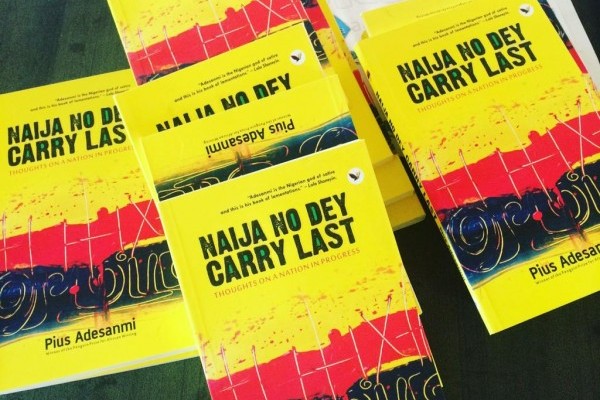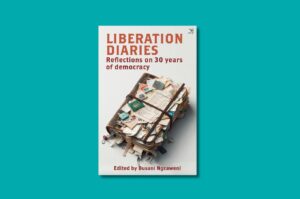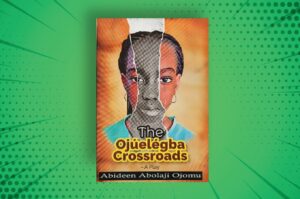There is, perhaps, an unavoidable risk that awaits anyone who seeks to critically engage any satirical work. First is the risk of interpretations.
This is as a result of the temptation on the part of the reviewer to go beyond the wit and humor in the work so as to unearth its very essence. As noted by the author in his introductory note, satirical pieces, his work inclusive—often runs the risk of losing its essence in the hands of less discerning readers who are wont to hurt their lungs in laughter only to quickly move on without giving the work a thought. While satirical pieces are often comical, the essence is never to have the reader in stitches.
In Naija No Dey Carry Last, the author’s witty narratives are rife with undertones of the actions and inactions of Nigeria’s political leaders and her citizens. Covering a number of years from Nigeria’s historical existence, Adesanmi’s essays are full of questions, on which every Nigerian must reflect in order to end the endless repetitions of horror in Nigeria’s history.
The book is divided into four main parts. The first part is titled Naija No Dey Carry Last and contains seventeen essays written mostly between 2008 and 2010. Here, the author presents Nigeria’s woes ranging from the mediocrity and ineptitude of leaders to the rot and decay in her operational system which are to the detriment of Nigerians. Elected officers are indicted and violence is redefined. In the words of the author, “Violence is the kind of figures that are in the newspapers everyday: billions and billions being looted in broad daylight by our friends in Abuja and the state capitals.” Here, the meaning of violence as a destructive force is asserted and demonstrated and the discerning reader is left with an illusory question mark on his head, waiting for both answers and actions.
The second part is titled “In the Beginning was the Word” and contains eleven essays written between 2009 and 2013. The profundity of Adesanmi’s satire is expressed in his style. The author experiments with his style of writing so as to get his message across to his readers. The very essence of communication is comprehension. If the receiver fails to get the message, although the sender may not entirely be at fault, the purpose of the communication will be defeated. Knowing Nigeria as a very religious nation with churches and ministries on all streets and “pastorpreneurs” as demigods, Adesanmi must have thought even the poorest Nigerian Christian to own and read the King James Version of the Bible, hence his use of biblical parody. Here, the author tackles the issue of insensitivity on the part of the leaders and further makes a case against religious institutions that often turn a blind eye to the corrupt practices of politicians instead of calling them to order. In addition, Nigerians are indicted for their inactions and destructive perseverance in the face of visionless leadership, political injustice and corruption. Comprehensibly, Sodom becomes a metaphor for Nigeria and the average Nigerian’s nonchalance is vividly demonstrated with a critical juxtaposition of the biblical Balaam’s ass and Nigerians.
The third part is titled “Open Letters to Godot” and contains eight essays written as letters between 2008 and 2010. This part mirrors Nigeria’s system of functionality institutionalized as a culture and norm. For instance, an average Nigerian politician cannot effectively function, or even feel safe without motorcades, sirens and countless aides. Under the guise of providing security for the elected government official, a dozen policemen are mobilized to secure the public officer from his constituents. Among other critical questions, “An Open Letter to Mrs. Farida Waziri” questions the act of religious institutions who accept donations from well known corrupt politicians and looters.
The fourth part is titled “All the World’s a Stage” and contains seven essays written between 2010 and 2013. Aptly titled, works in this part are narratives written loosely in an unconventional style which combines idiomatic features of fiction and drama. Nigeria’s main political actors appear in Adesanmi’s imaginative dramatis personae and each character plays a role which every Nigerian reader can relate to. While it could be rational to argue that news and happenstance from Nigeria’s corridors of power provides enough material for anyone who cares to write, Adesanmi’s imaginative depth is brought to bear in his mastery of language and dialogues which richly draws from his colloquial expressions. Save for a few typos, the book’s overall language and delivery is vivid, humorous, imaginative and compelling. Whether the arguments in the narratives which form the essence of the author’s offering are true or not is left to the conscience of Nigerians and Nigeria.
On the whole, Pius Adesanmi’s Naija No Dey Carry Last transcends a national discourse and a call for introspection and progression towards national development. It is evidence.
*********
Post image by @AMABBooks via Twitter
About the Author:
 Echezonachukwu Nduka is a scholar. His works of poetry, short fiction and non-fiction are published in reputable journals and anthologies. He tweets @echenduka.
Echezonachukwu Nduka is a scholar. His works of poetry, short fiction and non-fiction are published in reputable journals and anthologies. He tweets @echenduka.










Mojisola January 11, 2016 07:47
Dear Ainehi, Happy new year! I'm sure this meets you well. Please I am yet to get a response as regards your permission to re-publish this book review. Thank you as I await your response. Warm regards